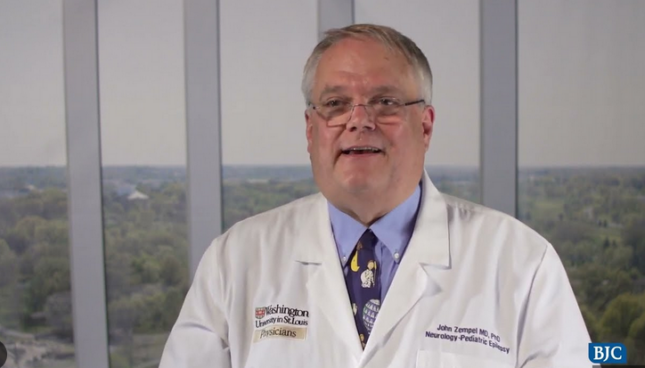Pediatric Neurology Outpatient at SLCH

Number of Fellows per Rotation: 2-4 Fellows
Length of Rotation: 5.1 weeks
Year of Rotation: First-year
Location: St. Louis Children’s Hospital Outpatient Clinics
Goal
The fellow will work in one of two specialty pediatric neurology clinics and become familiar with pediatric neurological disorders. Particularly disorders of high relevance to CAP including pediatric epilepsy and pediatric tic and movement disorders.
This rotation is supervised by the Pediatric Neurology faculty.
Objectives
To develop competence in the following areas:
- Fellows will accurately elicit histories focused on neurological disorders
- Fellows will perform focused neurological examinations
- Fellows will appropriately understand testing including laboratory, imaging, and studies for specific neurologic disorders such as CSF evaluations, EEG, evoked potentials, EMG/NCV, and sleep studies as indicated
- Fellows will demonstrate the ability to formulate a neurological differential diagnosis and to understand the rationale for treatment plans outlined by the Pediatric Neurology faculty
- Fellows will gain basic knowledge of epidemiology, pathophysiological explanations, diagnostic criteria, natural course, and treatment options for common neurological disorders of childhood
- Fellows will become particularly familiar with common treatment modalities in pediatric neurology
- The fellow will demonstrate the ability to seek appropriate supervision
- The fellow will demonstrate the ability to incorporate lessons learned from supervision into new knowledge, skills, and professional attitudes
- The fellow will develop the ability to use information technology to improve fund of knowledge and technical skills to provide better care to patients
- The fellow will communicate effectively with patients, their families, and other members of the treatment team
- The fellow will demonstrate sensitivity to patients’ ethnicity, gender, age, and disabilities
- The fellow will demonstrate a commitment to ethical principles such as confidentiality and informed consent
- The fellow will demonstrate respect, compassion, and integrity in carrying out patient care duties
- The fellow will demonstrate a commitment to pursuing professional development activities
- Fellows will complete documentation of patient encounters in a timely fashion
- The fellow will demonstrate effective coordination of care with a multidisciplinary treatment team
Measurement of Objectives
The objectives will be measured by attendance and by formal evaluation of the fellow’s participation and knowledge.
Description of Rotation
Fellows are assigned to teams consisting of attending neurologists, neurology resident physicians, and medical students doing neurology clerkships. They will evaluate and treat patients requiring inpatient hospitalization on the neurology service. Fellows may be assigned to the neurology consultation service if they choose an elective in neurology. Fellows are expected to attend didactic conferences occurring in the Department of Neurology during their rotations.